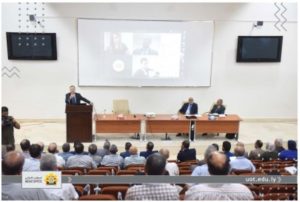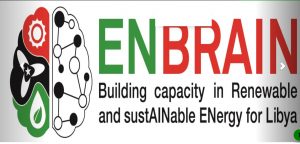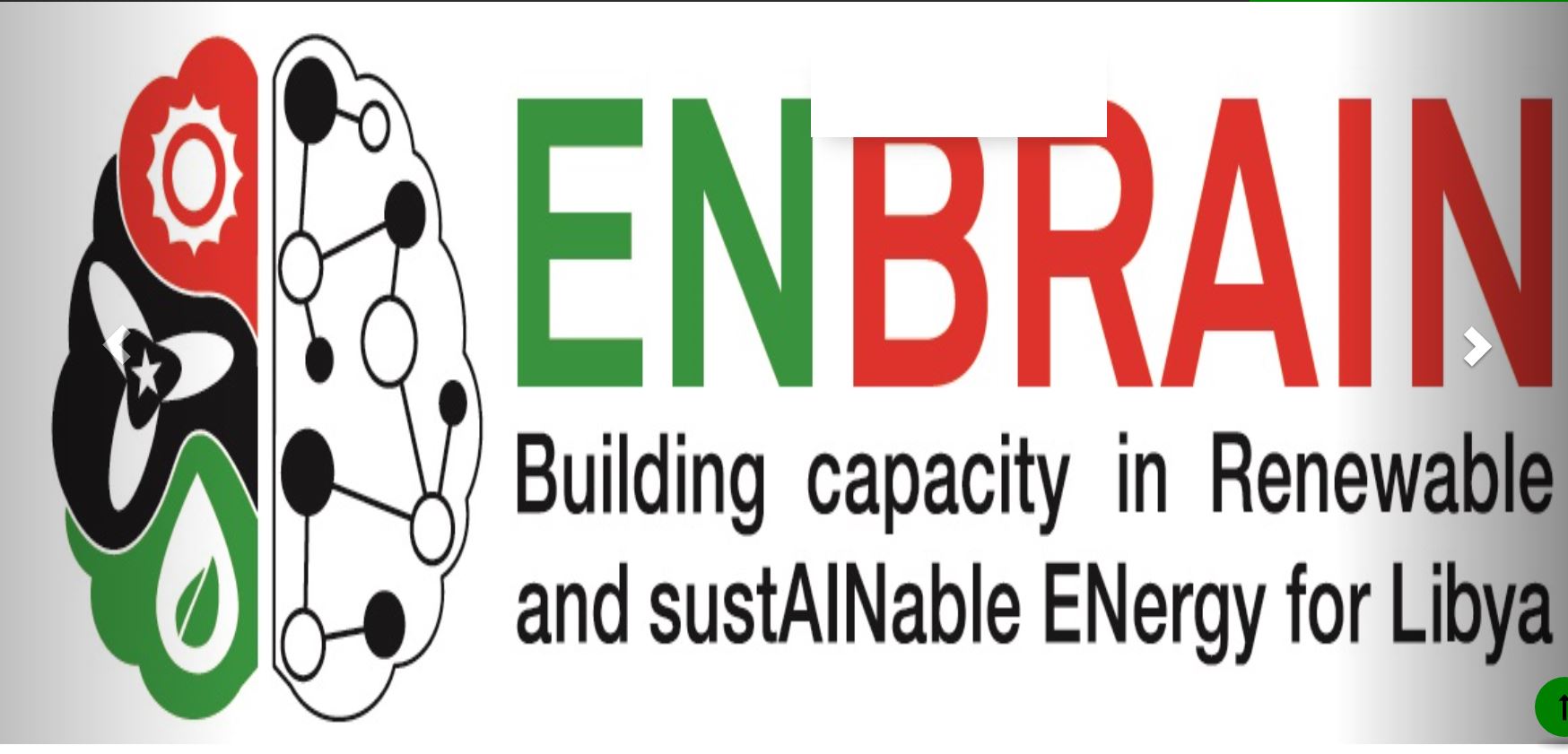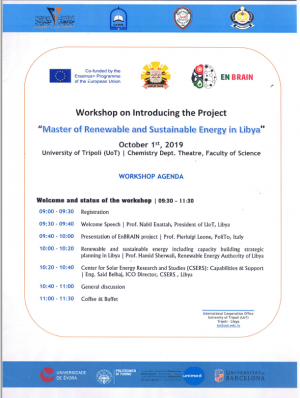By Sami Zaptia.

London, 7 October 2019:
Under the auspices of the European Union programme “Erasmus Plus” and in cooperation with Tripoli University, the university organized a workshop last Tuesday to introduce the project “Master of Renewable and Sustainable Energies in Libya”.
The meeting was attended by a number of dignitaries including the Tripoli based Ministers of Education and Planning, the Chancellor Tripoli University, the Head of the European Projects Unit of the Office of International Cooperation and a number of deans and representatives of Sirte, Sabha, Misrata, and Zawia universities.
Speakers urged the support of the project in order to raise local standards and reach the desired goals to keep up with the world in the use of alternative and renewable energies rather than traditional energy sources such as oil and gas.
They also urged the development of curriculum frameworks in the fields of renewable and sustainable energies for higher education institutions to meet the needs of Libyan and international graduates, present and future, and provide guidance in the development of courses and programs in the field of renewable energy, which is becoming increasingly important.
This workshop also discussed sustainable renewable energies between sources, technologies, impacts and economic and social considerations and their implications in Libya, as well as environmental energy, sustainability and institutional structural construction, and the introduction of the study program for renewable kindness. This includes implementation requirements, resources, stakeholders, as well as Libyan planning in the field of renewable energy, development and capacity building.
The aim of the one-day workshop is to create a document out of its deliberations entitled ‘‘Strategic Education Agenda in Renewable and Sustainable Energy’’, which will set guidelines for the development phase of the project.

The workshop was supported by ENBRAIN project within the tasks ‘‘Work Package 1’’ (WP1) tasked with making a presentation about the project, its goals and tasks being carried out, in particular the innovative educational platform based on new courses, e-learning methods and digital tools that may promote a systemic multi-dimensional vision of the global energy challenge.
Enbrain Project has a total budget of € 743,136.00 and is made up of the following nine Work Packages:
WP1 – Assessment of skills and competences requirements
WP2 – Identification of actual education portfolio in renewable and sustainable energy in Libya
WP3 – Design and develop of a Master in Renewable and Sustainable Energy
WP4 – Design and implementation of digital tools for Renewable and Sustainable Energy
WP5 – Teacher and staff training
WP8 – Dissemination & Exploitation
WP9 – Operative and financial management of the project
Enbrain says that it comes from the vision that despite the pressing need to tackle the energy challenge, the world is still stuck in taking a resolute action. It says that today, we are contributing to medium-term natural changes with a deadly cocktail of greenhouse effect and plundering of ecosystems whilst access to energy is imperative to eradicate global poverty.
It adds that there is a need to promote education in the energy field capable to grasp the energy question as a pillar of the sustainability challenge. It aims to resolve the issue of knowledge being compartmentalized, fragmentary and disjointed while reality and challenges are global, complex, multi-dimensional and planetary.
It says that innovative solutions and strategies to match the economic growth with the multidimensional targets of sustainability need to be developed. In this scenario, educational institutions, acting within their surroundings, become a fundamental player to create and empower new professional and future generations able to cope and implement the new paradigms.
In this regard, Africa is seen as a crucial player to tackle the world energy challenge since major global energy, climate and sustainable goals depend strongly on the future of this region.
Energy demand in Africa is expected to rise from 897 to 1322 Mtoe in the period from 2012 to 2040 according to the International Energy Agency 2014 as a result of economic and population growth. Although African greenhouse gas emissions could share around 5% of global emissions at 2040, major impacts from climate change could affect this vulnerable region with extreme weather events (IPCC 2014) and major socio-economic disruptions (EC 2015).
Finally, Enbrain says that the achievement of the 2030 Sustainable Development goals (UN 2016) will depend on how the access to affordable, reliable, sustainable and modern energy will be provided in Africa.
In this context, Libya has the largest proven oil reserves in Africa as well as a huge potential for renewable energy. It receives a strong solar radiation with an average of 2200 kWh/m2 and 3500 hours of solar brightness per year. The potential for wind energy is high too. Morocco, Egypt and Tunisia have taken significant steps towards the exploitation of wind power (Global Wind Energy Council 2015) with a total installed capacity at 2015 slightly less 2 GW.
However, Libya is not even among the list of the countries that are using wind power. The country still depends on fossil fuels to meet increasing energy demands. Above all, the current conflict and its reflection on the energy scene have led to the unavoidable conclusion of promoting renewable energy and energy efficiency actions.
However, so far there has been no assessment of renewable energy supply options in Libya. Barriers facing energy efficiency and renewable energy include economic, institutional, legal, regulatory and financial impediments. Furthermore, there remains an insufficient enabling environment to support the energy efficiency and renewable energy markets—lack of awareness, low capacity, no standardized contracts and protocols, underdeveloped financing modalities.
In line with the 2030 Agenda for Sustainable Development and its focus on people, the cross-cutting role of human capital becomes crucial to achieve a transformative change in energy – one that is efficient, effective, equitable, empowering, and long lasting.
The overall objective of this proposal is to fill this gap through the design and development of an innovative educational platform based on new courses, e-learning methods and digital tools that may promote a systemic multi-dimensional vision of the global energy challenge. This quality shift is able to capture the disrupting changes of future energy transitions that deals with the growing use of renewable energy sources and access to modern energy services in Africa.
The general aims of the project are to:
Raise awareness about the importance of a multi-dimensional approach to the global energy challenge;
Reinforce the role of Libya universities to promote energy transition within the multidimensional targets of sustainability;
Create a new class of thinkers able to cope with global energy challenges, envisage future targets for local community, support institutions in decision-making, engage citizens in sustainable practices.
Specific achievements of the projects are to:
Design of a Master in Renewable and Sustainable Energy with a multi-level approach to capacity building;
Pilot start-up multi-disciplinary seed-courses and curricula about Renewable and Sustainable Energy, using digital tools and with a linkage to the international community and the needs of the job market;
Create an open platform to engage citizens in renewable and sustainable energy via the creation of a MOOC for citizens.









